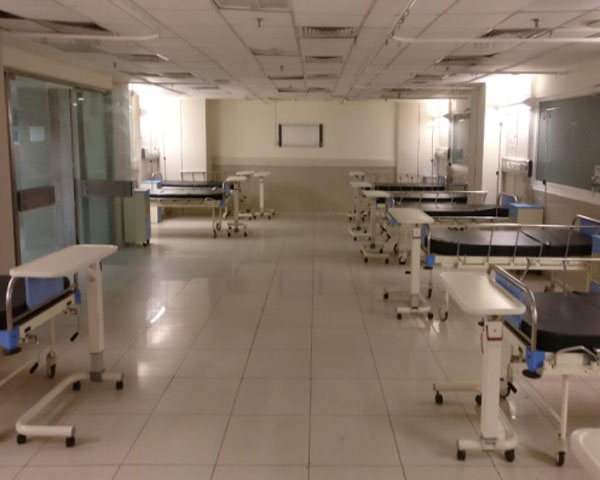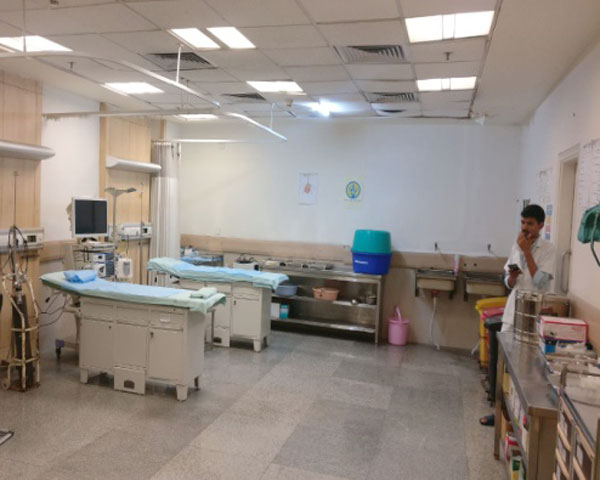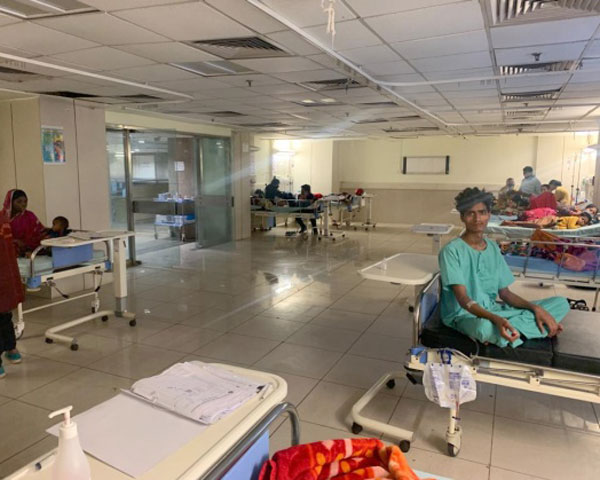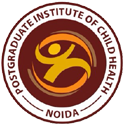
Post Graduate Institute of Child Health (PGICH) is a dedicated and one of the fastest growing pediatric institutes in India. The Division of Pediatric Gastroenterology at PGICH was established in January 2016 and is dedicated in providing the highest quality medical care and state-of-the-art techniques in the evaluation and treatment of gastrointestinal, liver and nutritional disorders. Successful outcomes in children with pediatric gastro and liver diseases require highest level of care focusing on early diagnosis and optimal management. Pediatric interventional endoscopy is a rare modality performed only in limited specialized centers across the country. Our department has faculties specialized in different aspects of Pediatric gastroenterology including advanced diagnostic and therapeutic endoscopic services. The department runs full fledged OPD, IPD and endoscopy (elective and emergency) services with an aim to provide comprehensive gastroenterology services to all patients less than 18 years of age under one roof. Faculty has participated actively in various national and international academic and research activities and reviewed multiple original research papers in journals of good repute.
At present the department is having 18 functional beds with 4 beds dedicated to intensive Care and high dependency unit. Department is running daily OPD services between 9.00am -1.00pm
Hepato-biliary Clinic: 2:30 to 4:00 PM (every Tuesday)
Abdominal Tuberculosis: 2:30 to 4:00 PM (every Thursday)
Following are the some of the common diseases and their symptoms for which we provide specialized care:-
Weekly intradepartmental and interdepartmental seminars on various topics of pediatric gastroenterology, hepatology, nutrition and endoscopy. Conduction of periodic CMEs and conferences.
This condition is referred to as failure to thrive or malnutrition. Poor weight gain is usually caused by insufficient intake in calories. Most children do not need a work-up unless they do not respond to first-line therapies. When children do not respond to these therapies or exhibit other signs of chronic disease, screening laboratory studies may be needed. These should include complete blood cell count, metabolic panel, erythrocyte sedimentation rate, and C-reactive protein. Children consuming gluten should be screened for celiac disease. Those who are not responding to first-line therapies or have positive screening labs need referral to a pediatric gastroenterologist.
Constipation affects up to 30% of children and accounts for about 5% of all visits to pediatricians. Functional constipation is responsible for the vast majority (> 95%) of cases in otherwise healthy children 1 year and older and is particularly common during the preschool years. It is typically diagnosed by the presence of hard, painful stools that are difficult to pass and can be accompanied by retentive posturing
Their growth should be assessed, they should undergo abdominal examination, examination of the lower spine and the perianal region. Management includes laxative, dietary therapy and toilet training. Children with red-flag symptoms or signs like blood in stools, failure to thrive, vomiting etc. should be referred to a pediatric gastroenterologist as appropriate.
Diarrhea is generally considered chronic when it lasts longer than two weeks. There are innumerable causes of chronic and persistent diarrhea, most common causes in children being secondary lactose intolerance, post infectious, milk protein allergy, toddler diarrhea, celiac disease, inflammatory bowel disease etc. Chronic diarrhea in young infants and children is best dealt by a pediatric gastroenterologist.
There are many different factors that can cause nausea and vomiting in children, ranging from short-lived gastrointestinal viruses to chronic GI disorders. While a typical "stomach bug" can often be managed at home, it's a good idea to consult a paediatric gastroenterologist if child is experiencing reoccurring nausea and/or vomiting.
Recurrent vomiting can be cyclic or chronic. Cyclic vomiting syndrome is characterized by episodes of severe vomiting that have no apparent cause. Episodes can last for hours or days and alternate with symptom-free periods. Episodes are similar, meaning that they tend to start at the same time of day, last the same length of time, and occur with the same symptoms and intensity. Treatment often involves lifestyle changes to help prevent the events that can trigger vomiting episodes. Medications, including anti-nausea and migraine therapies, may help lessen symptoms.
Chronic vomiting presents with daily emesis. These children have 1 to 2 emesis per day and are not very ill or dehydrated. GI causes of recurrent emesis are pyloric stenosis, eosinophilic esophagitis, peptic ulcer disease, and Crohn disease. Psychobehavioral causes, such as rumination and bulimia nervosa, can also cause recurrent vomiting. Children with recurrent emesis should be referred to a pediatric gastroenterologist.
Regurgitation occurs when food is brought into the stomach without the muscular activity seen in vomiting. It is commonly seen in infantile gastroesophageal reflux (GER), typically peaking around 3-4 months of age and subsiding by 1 year. "Happy spitters" do not require further investigation or treatment. When children who appear to have GER exhibit other symptoms such as anaemia, poor weight gain, irritability, and fussiness, it may be reasonable to attempt thickening of the feeds. When symptoms of GER troubling or persist beyond 12 months, the child should be referred to a pediatric gastroenterologist.
Chronic, functional abdominal pain occurs in about 15% of all children. However, chronic abdominal pain in the absence of red flags is rarely associated with organic disease. Every child with chronic abdominal pain should have a thorough history and physical examination, and most children should undergo screening for organic disease. In addition, details regarding changes of the pain when eating and stooling should be elicited. When the pain changes with intake of food, the child commonly has either some form of gastroesophageal disease or functional dyspepsia.
When the pain is centrally located without any red flags and does not vary with meals or stooling, it is consistent with functional abdominal pain. These are now considered to be disorders of gut-brain interaction and should not be presumed to be made up or in the child's head. Acknowledging the real nature of the symptoms can be helpful, along with emphasizing that the situation is not dangerous and many children will get better. Suggest making lifestyle changes including behavioural modification as the first approach and then offer second-line options.
When the symptoms are mild and early in the course of chronic pain, simple lifestyle changes can suffice. Children with more severe symptoms and/or red flag signs should be seen by a Pediatric gastroenterologist
Jaundice is a medical condition that mainly causes the eyes and urine to turn yellowish. The condition is caused by excessive bilirubin being present in the blood, causing the eyes, skin and mucous membranes in the mouth to turn yellow. Jaundice is actually common among new-borns (Physiological Jaundice) and it usually disappears within the initial few days of life while in other cases treatment for jaundice is done based on the cause. In older children, the occurrence of jaundice may be an indication of damage to the liver, infections or other ailments that are affecting the liver. Hence, children with jaundice should be provided with immediate medical attention and visit to Pediatric Gastroenterologuist.
Department has provided specialized services to large number of patients from Uttar Pradesh and Delhi since its inception from 2015. We get a large number of referrals from various pediatric health centers (primary, secondary, both government and private) for a variety of gastrointestinal disorders, both common and rare. Being a high output center for pediatric endoscopy a good proportion of the referral cases are related to conditions requiring endoscopic management especially in the younger kids. We have performed more than 1000 endoscopies for various indications like abdominal tuberculosis, gastrointestinal bleed, celiac disease, inflammatory bowel disease, foreign body ingestion etc. Interventional endoscopy has been successfully performed in very young children including infants with high risk varices and foreign body ingestion. Department has trained and sensitized many residents and nursing staff in the field of pediatric gastroenterology. Department has conducted many inter and intradepartmental academic activities time to time.
1. What does a Pediatric Gastroenterologist do?
A Pediatric Gastroenterologist manages digestive health issues in children. This field covers the entire gastrointestinal (GI) tract including the hepatobiliary-pancreatic systems (e.g., hepatitis and pancreatitis) and nutritional disorders (e.g., malnutrition and obesity).
2. When my Child Needs a Pediatric Gastroenterologist?
Diarrhea, constipation, vomiting, jaundice are some of the common symptoms seen in children. However, they can also signal a more serious medical condition like inflammatory bowel disease, Hirshsprungs disease, Chronic liver disease etc. When these and other digestive issues affect your child's daily normal activities, your child will need a pediatric gastroenterologist for holistic care.
3. Why should I choose PGICH for the gastroenterology treatment?
Here we treat children of all ages from newborn upto 18years of age. We have highly trained faculty and state of the art services including advanced endoscopy for the diagnosis and management of common and complex gastrointestinal and nutritional problems in children.
Following projects have been planned by the department for this academic year (2022-2023):



